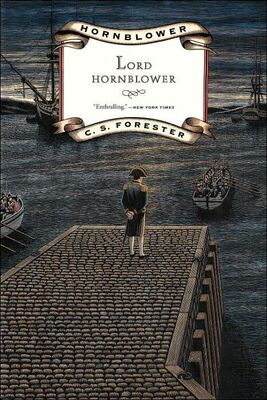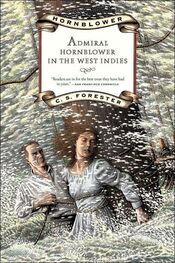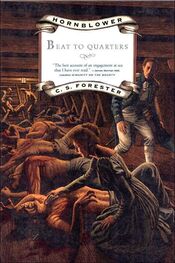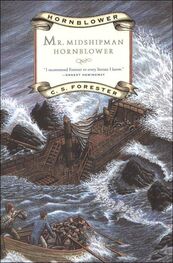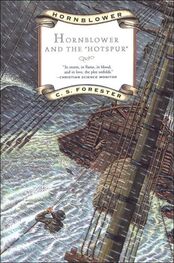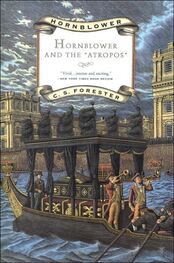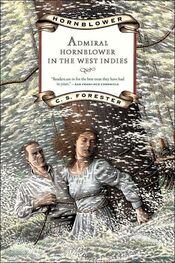It was chill in the dungeon, and yet Hornblower felt sweat upon his forehead. His weakness was growing with every second, his legs giving way under him even while he stood still, his head swimming. The mattress had hardly been laid upon the floor before he staggered to it and collapsed across it. Everything was forgotten in that moment, even his misery regarding Marie’s death. There was no room for remorse, none for apprehension. He lay there face downward, not quite unconscious, not quite asleep, but oblivious; the throbbing in his legs, the roaring in his ears, the pain in his shoulder, the misery in his soul—all these were nothings at that moment of collapse.
When the bars at the door clashed to herald the entrance of the aide-de-camp Hornblower had recovered somewhat. He was still lying face downward, by now almost enjoying the lack of need to move or think, when the aide-de-camp came in.
“Has the prisoner spoken at all?” he heard the aide-de-camp ask.
“Not a single word,” said the lieutenant.
“The depths of despair,” commented the aide-de-camp with facile sententiousness.
The remark irritated Hornblower, and he was further annoyed at being caught in such an undignified attitude. He turned over and sat up on his palliasse and glared up at the aide-de-camp.
“You have no requests to make?” asked the latter. “No letters you wish to write?”
He did not wish to write a letter upon which his gaolers would fall like vultures upon a corpse. Yet he had to be exigent, had to do something to remove that impression of being in despair. And with that he knew what he wanted and how desperately he wanted it.
“A bath,” he said. He put his hand to his hairy face. “A shave. Clean clothes.”
“A bath?” repeated the aide-de-camp, a little startled. Then a look of suspicion came into his face. “I cannot trust you with a razor. You would try to cheat the firing party.”
“Have one of your men shave me,” said Hornblower, and seeking for something to say to irritate he added. “You can tie my hands while he does it. But first a bucket of hot water, soap, and a towel. And a clean shirt at least.”
The aide-de-camp yielded.
“Very well,” he said.
A queer mood of light-headed exaltation came to Hornblower’s rescue. It was nothing to strip himself naked under the eyes of four curious men, to wash the filth from his body and to towel himself dry, ignoring the pain in his injured shoulder. It was not the legendary and strange Englishman that they were interested in so much as in the man about to die. This man soaping himself was shortly to pass through the gates ahead of them all; this white body was soon to be torn asunder by musket bullets. Telepathically he felt his gaolers’ morbid curiosity, and proudly and disdainfully he would indulge it. He dressed himself again while they watched his every movement. A trooper came in with his hands full of lather-bowls and razors.
“The regimental barber,” said the aide-de-camp. “He will shave you.”
There was no suggestion now of tying his hands; as Hornblower sat with the razor rasping over his throat he thought of reaching suddenly up and grasping the blade. His jugular vein, his carotid artery were there; one deep cut at the side and he would be out of his torment, and there would be the additional satisfaction of having completely outwitted the supercilious aide-de-camp. The temptation was momentarily keen; he could visualise his corpse collapsing in the chair, blood pouring from his throat, to the consternation of the officers. So clear was the vision for the moment that he dallied with it, enjoying it. But the fate of a suicide would not arouse nearly as much resentment as a judicial murder. He must let Bonaparte kill him, he must make that one last sacrifice to his duty. And Barbara—he would not like Barbara to think of him as a suicide.
The barber held a mirror before him just in time to break this new chain of thought; the face he looked at was the same familiar one, deeply sunburned. The lines about his mouth were perhaps more noticeable. The eyes were perhaps more pathetic than ever, more appealing. Disgustingly the forehead was a little higher, the scalp more visible. He nodded his approval to the barber, and rose to his feet as the towel was taken from under his chin, making himself stand firm despite the pain of the blisters on his feet. He swept his glance imperiously round, abashing the curious stares. The aide-de-camp pulled out his watch, most likely to conceal some embarrassment.
“In an hour the court martial will assemble,” he said. “Do you wish for food?”
“Certainly,” said Hornblower.
They brought him an omelette, bread, wine, cheese. There was no suggestion that anyone should eat with him; they sat and stared as he carried each mouthful to his lips. He had not eaten for a long time, and now that he felt clean he was ravenously hungry. Let them stare; he wanted to eat and drink. The wine was delicious, and he drank of it thirstily.
“The Emperor won two great victories last week,” said the aide-de-camp suddenly, breaking into Hornblower’s mood. Hornblower paused in the act of wiping his mouth with his napkin to stare at him.
“Your Wellington,” went on the aide-de-camp, “has met his destiny at last. Ney beat him thoroughly at a place south of Brussels called Les Quatre Bras, and on the same day His Majesty destroyed Blücher and the Prussians at Ligny, which is the old battlefield of Fleurus, according to the map. It was a pair of victories as decisive as Jena and Auerstadt.”
Hornblower forced himself to complete the wiping of his mouth apparently unmoved. He addressed himself to pouring himself out another glass of wine; he felt that the aide-de-camp, annoyed by his apparent indifference to his fate, was telling him this news in an endeavour to penetrate his armour. He tried to think of a riposte.
“How did this news reach you?” he asked, apparently all polite attention.
“The official bulletin reached us three days back. The Emperor was in full march for Brussels.”
“My felicitations, monsieur. For your sake I hope the news is true. But is there not a saying in your army about ‘to lie like a bulletin’?”
“This bulletin is from the Emperor’s own headquarters,” said the aide-de-camp indignantly.
“Then there can be no doubt about it, of course. Let us hope that Ney informed the Emperor correctly of the facts, for his defeat of Wellington is a remarkable reversal of history. In Spain Wellington defeated Ney several times, as well as Massena and Soult and Victor and Junot and all the others.”
The aide-de-camp’s expression showed how much the speech nettled him.
“There can be no doubt of this victory,” he said, and he added viciously, “Paris will hear the same day of the Emperor’s entry into Brussels and of the final suppression of brigandage in the Nivernais.”
“Oh,” said Hornblower politely, with raised eyebrows. “You have brigands in the Nivernais? I commiserate with you, sir—but I met none in my travels through the country.”
The aide-de-camp’s mortification showed in his face more plainly than ever, and Hornblower sipped his wine and felt pleased with himself. What with the wine and his lightheaded elation he could find little to fear in the prospect that soon he would be condemned to death. The aide-de-camp rose and clanked out of the cell, while Hornblower pushed back his chair and stretched his legs with an elaborate pose of well-being that was only partly assumed. They sat on in silence, himself and his three watchers, for some considerable time before the clash of the bars told of the door being opened afresh.
“The court is waiting. Come,” said the aide-de-camp.
No sense of well-being could disguise from Hornblower the soreness of his feet. He tried to walk with dignity, but he could only limp grotesquely—he remembered how only yesterday he had found that the first hundred yards after a halt was acutely painful until his feet grew numb. And today it was far less than a hundred yards to the great hall of the château. As Hornblower and his escort came up onto ground level they met the Count, walking between two Hussars, and the groups paused for a moment.
Читать дальше